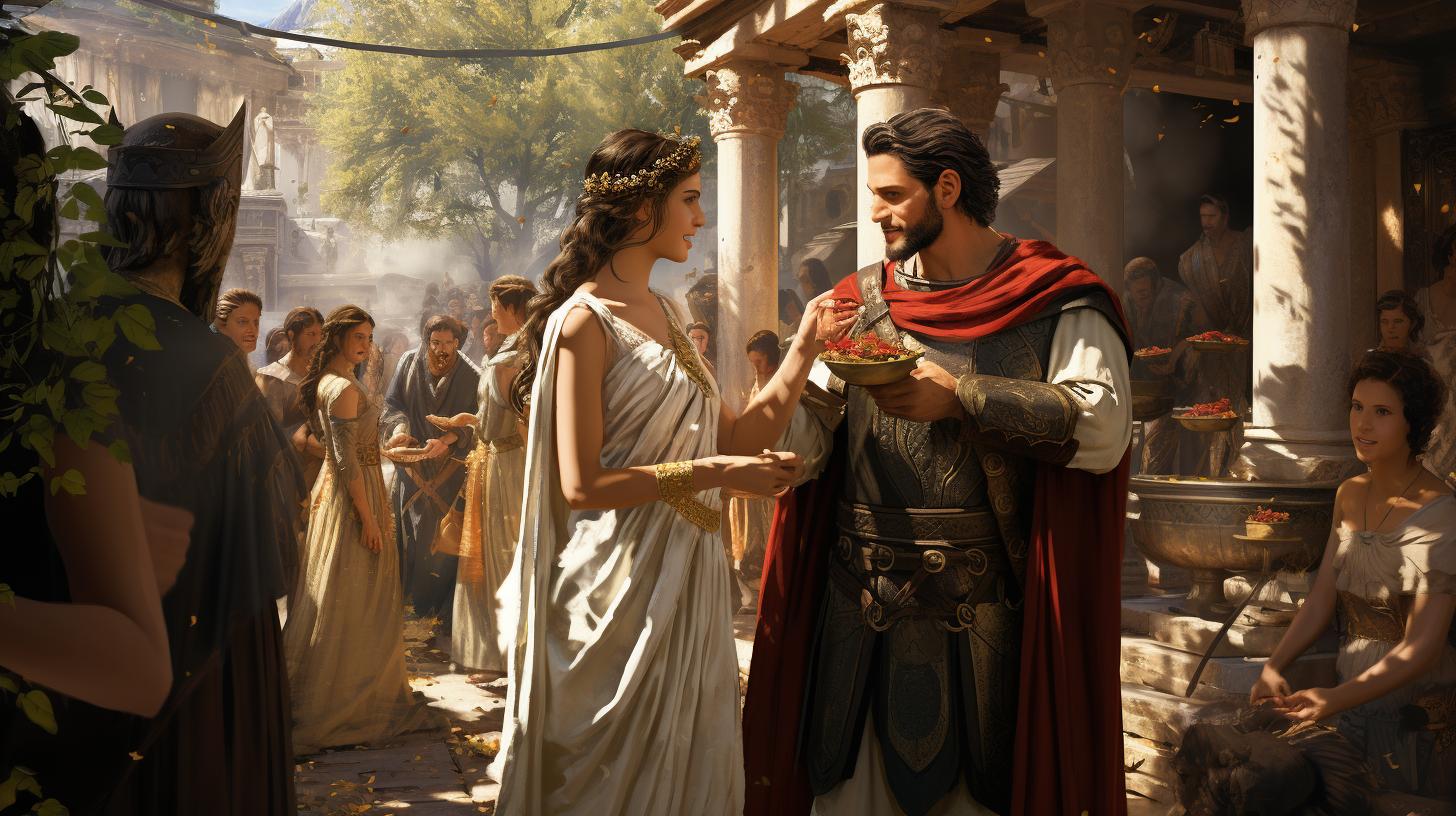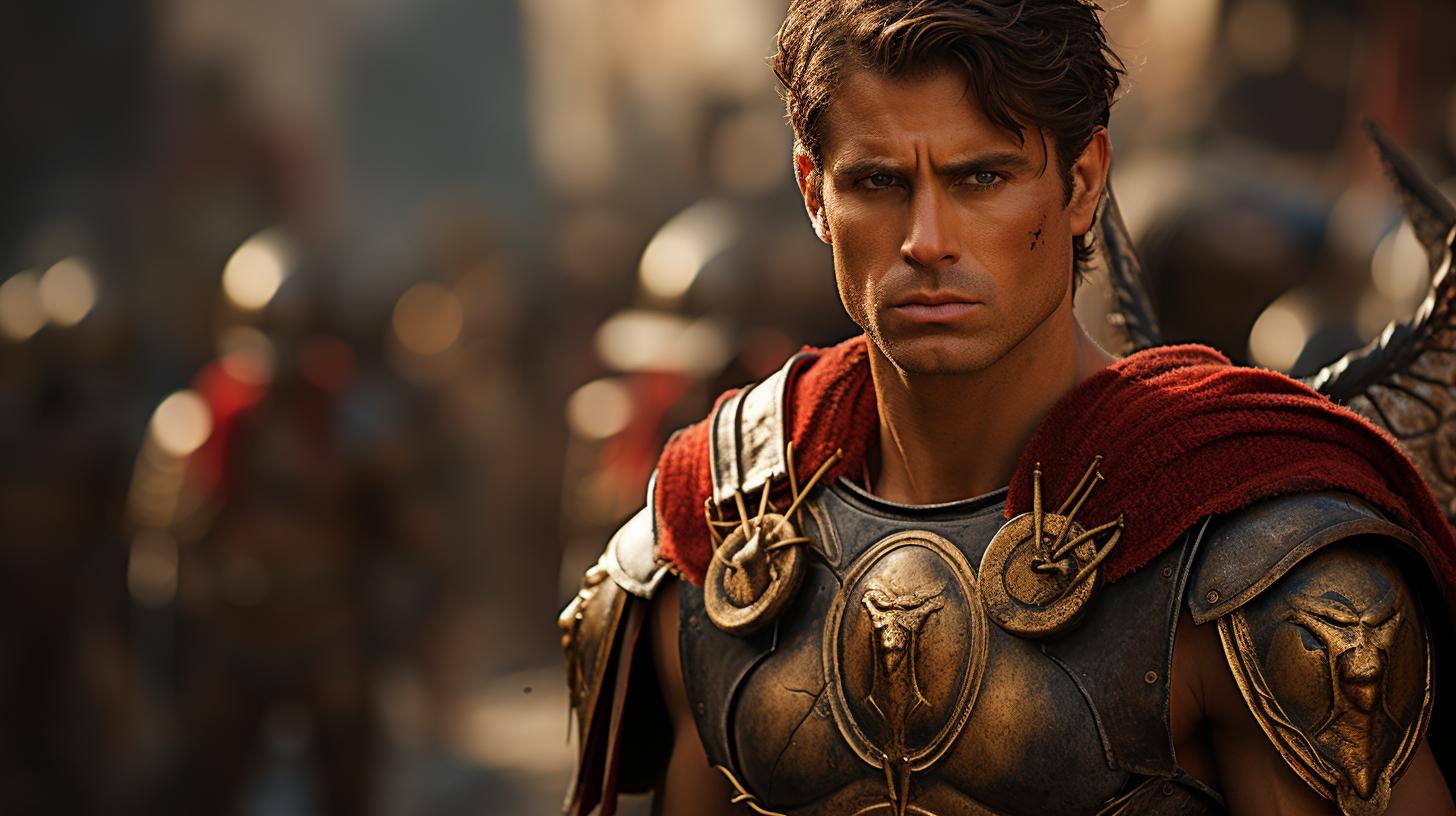Hymenaios: The Greek God of Weddings and Nuptial Songs

Hymenaios, the Greek god of weddings and nuptial songs, holds a significant role in Greek mythology. Portrayed as a winged child carrying a bridal torch, Hymenaios is invoked in hymeneal or wedding songs.
There are multiple versions regarding his origin and parentage, with some sources claiming he is the son of Apollo and a Muse, while others attribute his fatherhood to Dionysus. Legends speak of Hymenaios’ heroic acts and his eventual transformation into a god of weddings.
In Greek literature, renowned authors such as Sappho, Euripides, and Aristophanes reference Hymenaios and his wedding songs.
Overview of Hymenaios Greek God
Hymenaios, the Greek god of weddings, holds a significant place in ancient Greek mythology and culture. This section provides insights into the role of Hymenaios as the god of weddings and explores the various representations of this deity within Greek mythology.
Hymenaios: The Greek God of Weddings
Hymenaios is revered as the Greek god who presides over wedding ceremonies and celebrations. He is invoked during the hymeneal or nuptial songs, symbolizing the joy and union of couples embarking on the sacred journey of marriage.
Often depicted as a winged child holding a bridal torch, Hymenaios personifies the blessings bestowed upon wedding rites and the harmonious union of two souls.
The Representation of Hymenaios in Greek Mythology
Hymenaios finds his place in Greek mythology as an integral part of the divine realm.
There are multiple versions regarding his origin and parentage, with some accounts attributing his lineage to Apollo, the god of music, and one of the Muses, while others claim Dionysus, the god of wine, as his father.
The representation of Hymenaios captures the essence of youthful beauty and symbolizes the transformative power of love and marriage in the Greek cultural context.
In Greek literature, Hymenaios and his role in wedding ceremonies are frequently mentioned.
Renowned poets such as Sappho and notable playwrights like Euripides and Aristophanes often refer to Hymenaios and his influence in their works, highlighting the significance of this deity in Greek cultural and literary traditions.
The following sections delve into the origins and genealogy of Hymenaios, presenting the diverse accounts regarding his parentage and exploring the legends and myths associated with this revered Greek god.
Origins and Genealogy of Hymenaios
Origins and Genealogy of Hymenaios
The Various Versions of Hymenaios’ Parentage
There are different versions surrounding the parentage of Hymenaios, the Greek god of weddings and nuptial songs.
According to some myths, he is believed to be the son of Apollo and one of the Muses. However, there are also stories that attribute his fatherhood to Dionysus. These conflicting accounts leave scholars in debate, trying to determine the true lineage of Hymenaios.
Possible Mothers of Hymenaios among the Musas
Among the Muses, several potential mothers are mentioned in relation to Hymenaios. Some sources suggest Cleo, Magnes, Urania, Clío, or Terpsícore as his mother. The exact connection between Hymenaios and these Muses is unclear, adding to the mystery of his heritage.
Debates on Hymenaios’ Paternity: Apollo or Dionysus?
While the parentage of Hymenaios remains disputed, the primary contenders are Apollo and Dionysus. Apollo, the god of music and the arts, is often believed to be the father, given the association of Hymenaios with songs and weddings.
On the other hand, Dionysus, as the god of revelry and ecstasy, brings another perspective to his potential origin. Scholars continue to discuss and debate the true paternity of Hymenaios.
As we explore the origins and genealogy of Hymenaios, we encounter different versions and interpretations, leading to ongoing scholarly discussions. The parentage and lineage of this Greek god remain shrouded in mystery, offering intriguing insights into the complex nature of mythology.
Legends and Myths Associated with Hymenaios
Legends and myths surrounding Hymenaios add depth to his character and significance in Greek culture. These stories showcase his heroism, romantic entanglements, and transformation into a revered deity invoked in wedding celebrations.
Hymenaios in Argive Tradition: The Hero of Doncellas
In one Argive tradition, Hymenaios is portrayed as a young man from Argos who valiantly saved maidens from pirates. His courageous acts were celebrated in nuptial songs sung by these rescued maidens.
This heroism elevated Hymenaios’ status and contributed to his association with weddings and the protection of brides-to-be.
Hymenaios in Athenian Legends: Love and Rescue
In Athenian legends, Hymenaios is depicted as a remarkably attractive young man who fell in love with a maiden. He disguised himself as a woman and followed her to Eleusis. However, he and the maiden were captured by bandits.
Despite the dire situation, Hymenaios managed to rescue the women, including his beloved, and safely return to Athens. This captivating tale of love and rescue further solidified Hymenaios’ connection to matrimonial unions and enduring love.
The Transformation of Hymenaios into a Wedding God
As a result of his heroic acts and associations with love and weddings, Hymenaios underwent a transformation, becoming a deity invoked during wedding ceremonies. His divine status allowed him to marry the woman he loved after his valiant efforts.
This elevation to a wedding god solidified his role in the sacred bond of marriage, and he was honored and invoked through joyous hymeneal songs and rituals.
Hymenaios’ Role in Greek Culture and Literature
Hymenaios, the Greek god of weddings and nuptial songs, holds a significant place in Greek culture and literature.
His portrayal in various poetic and dramatic works showcases his importance in the realm of weddings and celebrations. Let’s explore some of the notable instances of Hymenaios’ presence in Greek poetry, drama, and his significance in wedding traditions.
Hymenaios in Greek Poetry: Sappho and the Lyric Tradition
In the realm of Greek poetry, Hymenaios frequently appears in the works of renowned poet Sappho and other lyric poets. Sappho, known for her heartfelt verses and romantic themes, often invoked Hymenaios in her odes and songs.
Hymenaios’ role as the god of weddings perfectly complemented the poetic expression of love, desire, and the power of marriage bonds. These lyrical compositions illuminated the importance of Hymenaios’ blessings in the union of two souls.
Hymenaios in Greek Drama: Euripides and Aristophanes
Within the realm of Greek drama, playwrights like Euripides and Aristophanes incorporated Hymenaios as a prominent figure in their works. Euripides, known for his tragic plays, often integrated Hymenaios into tales of love, loss, and ultimate redemption.
Aristophanes, a master of comedy, skillfully employed Hymenaios to add humor and satire to his theatrical pieces, creating a lively juxtaposition between the solemnity of weddings and the comic elements associated with marriage celebrations.
Hymenaios’ Significance in Wedding Celebrations
Beyond the realms of literature and art, Hymenaios played a crucial role in Greek wedding celebrations. As the god of weddings, he was revered and invoked during the marriage ceremonies. From the singing of the matrimonial hymns to the lighting of the bridal torch, Hymenaios’ presence was considered essential for a successful union.
His blessings were sought to ensure fertility, happiness, and prosperity in the married life of the couple. The rituals associated with Hymenaios’ involvement reflected the deep-rooted significance of his presence in the fabric of Greek wedding traditions.
.




















